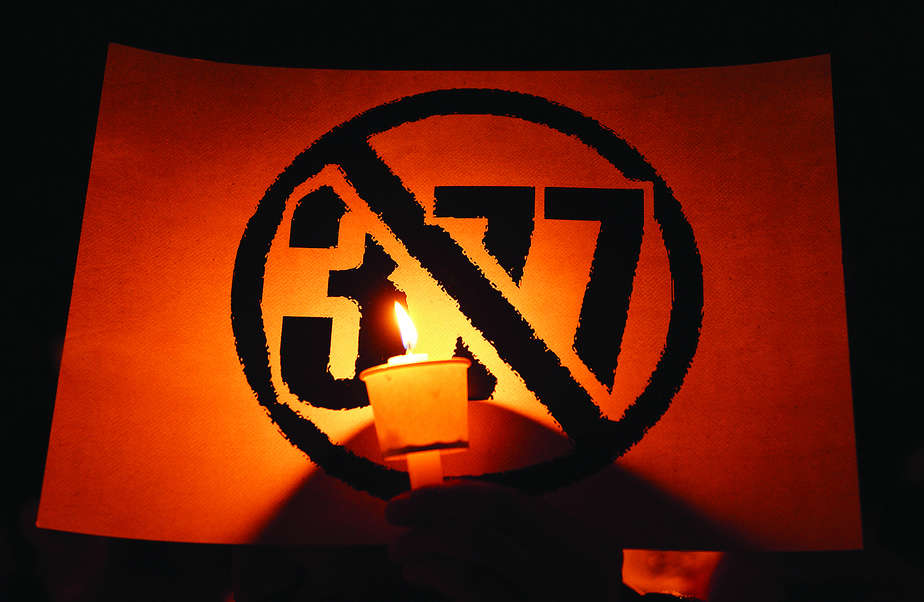
An Indian LGBT activist holds a placard during a demonstration against the Supreme Court's reinstatement of Section 377, which bans gay sex in a law dating from India's colonial era, in Bangalore on January 28, 2014. India's top court January 28 rejected a plea filed by the government and activist groups to review its shock ruling which reinstated a colonial-era ban on gay sex. AFP PHOTO/Manjunath KIRAN / AFP PHOTO / Manjunath Kiran
The first thing that caught my attention when I read Section 377 was the phrase “against the order of nature”. I had heard this before — that homosexuality is not natural. If this line of argument is to be believed, then it’s about time we start to banning pacemakers and hip implants. It’s better to die from a heart attack rather than have a bypass surgery, which is definitely against the “order of nature”.
But that what exactly is natural? Numerous studies have shown that homosexuality is seen in almost all animal species, from lions to worms. How can something that happens with every species on this planet not be natural?
Hundreds of scientific studies, from evolutionary biology to psychology, have established that homosexuality is a normal variant of natural. Those who ask for more research are deluded. Even in the face of such strong scientific evidence, the only thing that stops people from accepting homosexuality is bigotry. People are born gay, you can’t “cure” it out of them, or ask them to “choose” heterosexuality. Thirty to 40 per cent of sexual orientation is heritable — how can you choose something that you are genetically manifested to have?
Yesterday, Subramanian Swamy said homosexuality is against Hindutva. Even if we overlook LGBTQ examples like Lord Ayyappa, Mohini and Shikhandi, when did Hinduism become the yardstick to decide the legality of rights? It doesn’t matter what religious scripts say, the Constitution decides what is right and what isn’t. And Article 21, after the privacy verdict last year, is clearly interpreted to protect the rights of every queer Indian.
Scrapping 377 is not just the right decision, but also an economic one. Homophobia cost the Indian economy almost one per cent of its GDP. Along with the financial incentive, decriminalising homosexuality will help in preventing stigma and discrimination at the workplace and in colleges. It will also help in curbing the transmission of HIV and other STDs, and encourage gay patients to seek better care.
The number of homosexuals in India runs into millions. When we deny acknowledging gay India, we make it worse for everyone. Homophobia and lack of acceptance forces the queer population to settle with heterosexual partners only to escape the hate shown to their true identities. This doesn’t only translate into bad marriages and divorce, but also leads to suicides.
It ends well for no one. You can’t undo someone’s sexuality. If you can’t make a heterosexual person homosexual, how can you expect the reverse to happen?
According to a study of 24,000 participants, almost 25 per cent of them felt some form of same-sex attraction. Even with conservative estimations from some years ago, almost 2-13 per cent of Indians would identify as queer. That is around 2-12 million Indians, barely a minuscule minority (a reference to the Supreme Court’s 2013 verdict). There is a very good statistical chance that someone from your family or friend is directly impacted by Section 377. If you don’t know of anyone, maybe you need to talk to your loved ones with a little more love and acceptance.
There is a strong scientific consensus that gay and trans-gender people are more prone to mental health issues. Coming to terms with one’s sexual identity is an emotionally draining process. It is com-pounded by homophobia, which can translate anywhere from high school bullying to rape.
Scrapping Section 377 is the least we owe our queer friends. It’s time to stop ignorance and intolerance by setting rules of who and how to love. Love comes in all shapes and types. As we move towards a more equal India, it’s time to accept all kinds of love with more pride and less prejudice.
www.newslaundry.com
On the principle of 'Sarvajan Hitaya, Sarvajan Sukhaya' -- Welfare for all, Happiness for all…
With hundreds reported missing in Delhi this year, this guide explains how families can use…
The case came to light after a 35-year-old woman from Panipat alleged that she had…
During the investigation, CCTV footage helped identify the suspects, according to Delhi Police
The launch took place during the inauguration of the Delhi Police Exhibition Hall at Connaught…
The 28-year-old factory owner was taken to Satyawadi Raja Harish Chandra Hospital in Delhi, while…